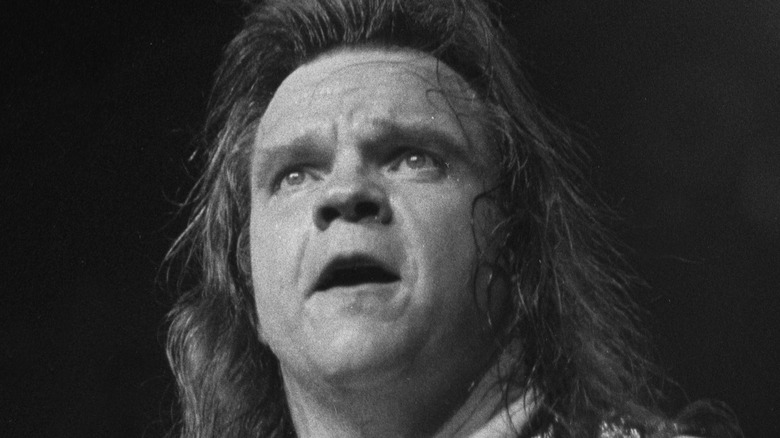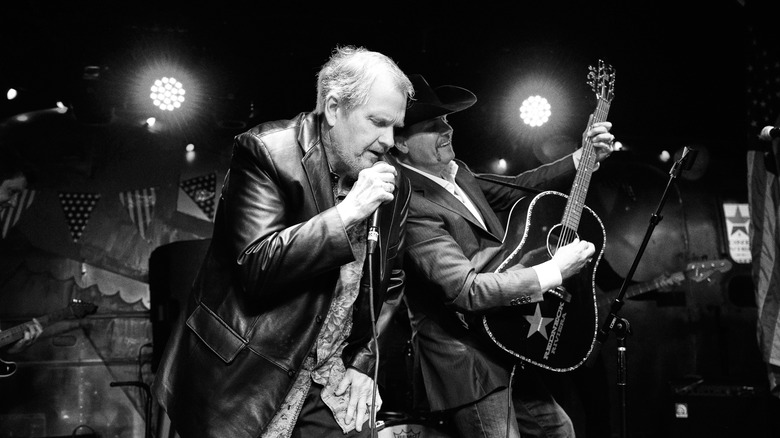The Crazy Way Meat Loaf Was Stripped Of His Money
His name is Robert Paulson. Well, actually, it's Marvin Lee Aday. That's right: the loafy man of meat who would do anything for love — except that, of course — went horribly, horribly broke back in the day. This is long before "Fight Club," his amazing meltdown against Gary Busey on Celebrity Apprentice, or his rousingly drunk rendition of America the Beautiful at a Mitt Romney convention.
Rock's most warbling vibrato started off as a bouncer after leaving school and fleeing to Los Angeles in 1967, per Biography. A self-proclaimed outcast, Meat Loaf started his first band Meat Loaf Soul around this time, before finding kindred spirits in musical theater for his hammy, over-the-top performances. He landed a role in "Hair," which went to Broadway, and from there worked on "The Rocky Horror Picture Show," which defied the odds and went on to earn $112 million since its release. It was then that Meat Loaf recorded one of history's best-selling records of all time, "Bat Out of Hell," in 1977. Unknown to most, this record is, surprisingly, the No. 3 best-selling album of all time, at 43 million copies sold, beaten only by Michael Jackson's "Thriller" and AC/DC's "Back in Black," per Mentalfloss. It stayed at No. 1 for almost 400 weeks straight, per the Guardian, and has sold a consistent 200k copies per year since its release, as described in Heavy.
So how is it possible that a mere six years later, in 1983, Meat Loaf filed for Chapter 11 bankruptcy?
I would do anything for cash, so yes, I will do that
As Meat Loaf himself said, "As Bat got bigger, I got crazier. It was like some terrible curse where everything I'd ever wished for turned into a nightmare, and it was rapidly turning me into a maniac." He discovered cocaine, and as he started falling apart, his relationship with his musical partner, Jim Steinman, disintegrated. Meat Loaf saw himself as the actor, Steinman as the playwright, and the two had collaborated to bring "Bat Out of Hell" to light. From 1978 to 1984, Meat Loaf lost Steinman, his voice, experienced severe depression, and was eventually sued by Steinman over music rights for a whopping 45 lawsuits equaling $80 million in total. The only choice Meat Loaf had was to file for bankruptcy.
Meat Loaf and Steinman would eventually reconcile and come back together for 1993's "Bat Out of Hell II: Back into Hell," which contained the megahit opera rock anthem, "I'd Do Anything for Love (But I Won't Do That)." The lawsuits also delayed all the royalties that Meat Loaf was supposed to receive from his records sales, and finally, in 1997, the royalties made their way to him.
He would still have some work to do before getting back to his financially successful ways, but he'd get there. Sure, he might have had to do things like cameo in a Spice Girls movie in order to resurrect himself, as described in Ultimate Classic Rock, but hey, as the man once said ... two out of three ain't bad.
Back on top in the 21st Century
Meat Loaf was refreshed and looking to build upon the momentum he had from the start of his career rebirth in the 1990s. While his appearance in the Spice Girls movie may not have been a real high point, he had roles and cameos in more critically acclaimed cinematic fare like 1992's "Wayne's World" and 1999's "Fight Club." He also appeared at the beginning of "Tenacious D in The Pick Of Destiny" playing Jack Black's father — even belting out a few lines of the movie's opening song "Kickapoo" — in 2006.
Meanwhile, he still had a foot in the world of music and continued to put out albums and toured extensively. He released a series of albums including "Bat Out of Hell III" in 2006, 2010's "Hang Cool Teddy Bear," and 2011's "Hell in a Handbasket."
This was all in the face of health issues that could've easily undone much of the work he had done to rebuild his career. According to Biography, Meat Loaf collapsed on stage during a London performance in 2003. Doctors subsequently diagnosed him with Wolff-Parkinson-White syndrome, which is known to cause an irregular heartbeat. In 2016, he collapsed on stage again, this time in Edmonton, Alberta. This time, his management released a statement chalking it up to dehydration.
Meat Loaf has a well-deserved place in music history, but it's perhaps even more notable for the obstacles he overcame — especially the financial and health obstacles — in the process.


